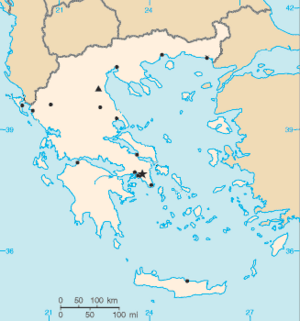Welcome to the Virtual Education Wiki ~ Open Education Wiki
Greece: Difference between revisions
No edit summary |
|||
| Line 1: | Line 1: | ||
== Greece in a nutshell == | |||
[[Image:000_Greqia_harta.PNG|thumb|right|300px|Source: Original png on: http://upload.wikimedia.org/wikipedia/commons/5/58/000_Greqia_harta.PNG|Administrative division]] | |||
Greece, officially the Hellenic Republic, is a parliamentary republic; Greece is in southeastern Europe, situated on the southern end of the Balkan Peninsula. Greece is a developed country, a member of the European Union since 1981, a member of the Economic and Monetary Union of the European Union since 2001, NATO since 1952. Athens is the capital; Thessaloniki, Patras, Heraklion, Volos, Ioannina, Larissa and Kavala are some of the country's other major cities. | |||
Greece's total area is 131,990 km², with a water percentage of 0.8669. According to the NSSG (National Statistical Service of Greece ), Greece's total population in 2001 was 10,964,020; extimated population in 2008 is 11,216,708, the 74th largest population in the World. | |||
== Country education system == | == Country education system == | ||
Revision as of 10:09, 2 September 2008
Greece in a nutshell
Greece, officially the Hellenic Republic, is a parliamentary republic; Greece is in southeastern Europe, situated on the southern end of the Balkan Peninsula. Greece is a developed country, a member of the European Union since 1981, a member of the Economic and Monetary Union of the European Union since 2001, NATO since 1952. Athens is the capital; Thessaloniki, Patras, Heraklion, Volos, Ioannina, Larissa and Kavala are some of the country's other major cities.
Greece's total area is 131,990 km², with a water percentage of 0.8669. According to the NSSG (National Statistical Service of Greece ), Greece's total population in 2001 was 10,964,020; extimated population in 2008 is 11,216,708, the 74th largest population in the World.
